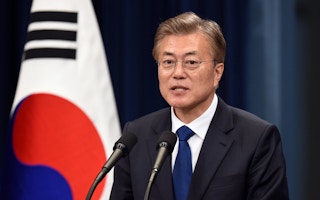South Korea’s current energy policy will see the East Asian country phase out coal power a quarter-century later than required to meet international climate goals, according to a new analysis by climate research institute Climate Analytics, a Berlin-headquartered non-profit.
To continue reading, subscribe to Eco‑Business.
There's something for everyone. We offer a range of subscription plans.
- Access our stories and receive our Insights Weekly newsletter with the free EB Member plan.
- Unlock unlimited access to our content and archive with EB Circle.
- Publish your content with EB Premium.
Last September, South Korean President Moon Jae-in unveiled plans to shutter half of the country’s coal fleet by 2034 and triple the number of operating solar and wind installations by 2025.
But Climate Analytics says that under Jae-in’s plan, 27 gigawatts (GW) of coal-fired power capacity will still be online in 2034, with the last coal plant to shut by 2054. This is 25 years too late for South Korea to play its part in meeting the Paris Agreement’s target to keep heating within 1.5 degrees Celsius above pre-industrial levels, the report says.
Climate Analytics recommends that South Korea cuts 4.2 GW of coal capacity each year, with coal combustion to cease entirely by 2029.
This would deal a heavy blow to coal assets currently under construction. At present, there are seven new coal power units with a capacity of 7.3 GW being built in South Korea. The latest addition, the 2,100-megawatt Samcheok Blue Power project, is slated to come online in 2024. It is expected to be the country’s last domestic coal project.
South Korea has much to gain from phasing out coal earlier, least of all an improved global reputation by playing a more active role in climate mitigation efforts. In recent years, the country has come under fire for being one of the world’s top financiers of coal. It wasn’t until April this year that the government responded to growing international pressure, pledging to end funding such projects.
Besides such gains, South Korea could also reap immediate benefits at home, Climate Analytics writes. It estimates that ditching the fuel this decade could halve the number of premature deaths linked to air pollution from coal plants over the next five years, preventing more than 18,000 early deaths including nearly 6,000 abroad in China, Japan, and North Korea, compared to the 2054 phase-out timeline.
Air pollution has been linked to premature deaths due to increased risk of cardiovascular and respiratory diseases, preterm births, and other health impacts.
The burning of coal—the world’s dirtiest fossil fuel—is a significant source of air pollution in South Korea, which ranks among countries where air pollution exceeds levels deemed safe by the World Health Organisation.
In South Korea, the report estimates that 280,000 years of potential life will be lost as a result of air pollution from the country’s coal power fleet under current policies.
In contrast, a Paris-aligned phase-out pathway could save more than 330,000 life years, both domestically and overseas, between 2021 and 2054, the report finds, which was produced in collaboration with Seoul-based climate policy group Solutions for Our Climate, environmental campaigners Greenpeace, and the Centre for Research on Energy and Clean Air, an international research organisation.
South Korea’s trade ministry unveiled its latest power development blueprint, the 9th basic electricity plan, in December last year. The roadmap charts a development path for each electricity generation type through to 2034.
It envisions coal and nuclear to rapidly make way for gas and renewables in the years ahead. Renewables will make up 35 per cent of the electricity mix by 2030, up from 15 per cent today, the ministry predicts. Solar capacity is forecast to more than double, with wind to grow from 2 GW to 18 GW.
Both coal and nuclear are predicted to peak by 2024 before declining. The country currently hosts 56 coal power plants, which account for about 40 per cent of the nation’s electricity, a share the government expects to decrease by 23 per cent by 2030 from 2019 levels.
Jae-in announced last October that the nation would commit to achieving carbon neutrality by mid-century, making good on an election promise made earlier in 2020.
The president said in September that climate change had become “the most important problem in our generation,” after the nation had been battered by three major typhoons in just two weeks in late August and early September.
Jeehye Park, director of Solutions for Our Climate’s coal programme, said that amid the bleak outlook for the coal industry and the fossil fuel’s detrimental impacts on people’s health, it seemed “ethically wrong” to go forward with projects currently under construction.
“South Korea, especially as the host country for the Partnering for Green Growth and the Global Goals 2030 (P4G) Summit at the end of this month, must expedite its coal phase-out to show genuine leadership in sustainability,” she told Eco-Business.
“Coal power not only devastates our climate but also our health and wellbeing, which President Moon cannot ignore as a key United Nations Sustainable Development Goal,” she added.










